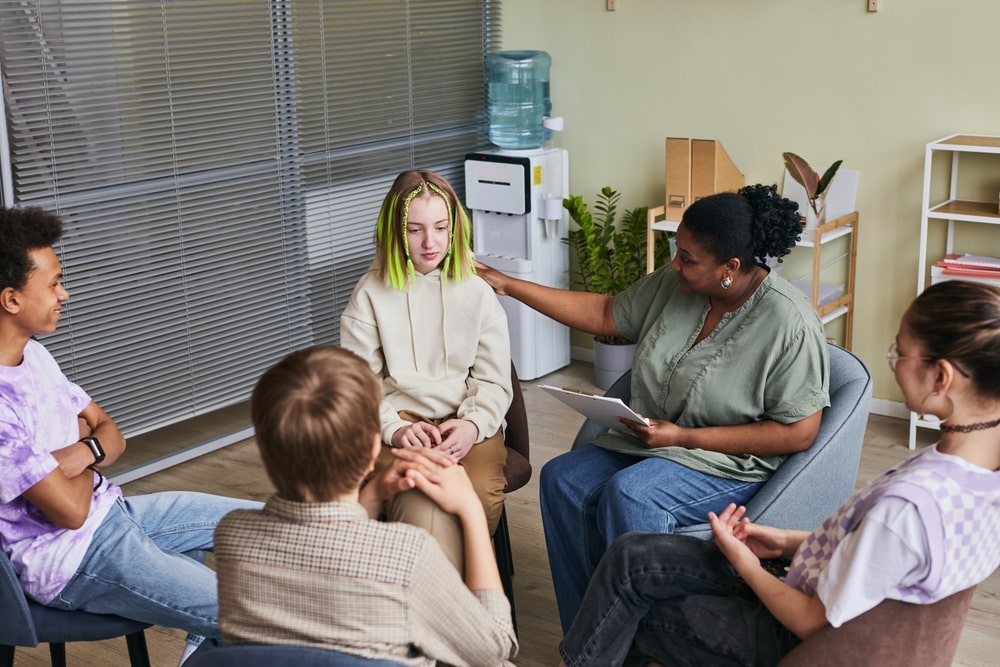Depression, clinically referred to as major depressive disorder (MDD), is listed in the Diagnostic and Statistical Manual of Mental Disorders, Fifth Edition (DSM-5) as a mental health condition characterized by persistently depressed mood or loss of interest in activities, causing significant impairment in daily life. Depression is one of the most frequent mental health illnesses that teenagers experience. In 2021, an estimated 5 million adolescents aged 12 to 17, making up 20.1% of this population, in the United States had at least one major depressive episode. MDD is a complex psychiatric disorder that affects mood, cognition, behavior, and impedes adaptive functioning. There are a variety of approaches as well as a range of treatment options when it comes to treating teenagers with depression. The American Academy of Family Physicians (AAFP) underscores common components of treatment plans for teenagers with MDD, which typically include one or more psychotherapeutic modality as well as medication. Treatment for adolescent depression will require a customized and nuanced treatment plan, where all treatment options are considered, incorporating medication when needed and utilizing the best possible therapeutic modalities that are expressly geared to each teenager’s personal needs.
Group Therapy
Group therapy, as explained by Verywell Mind, “is a form of psychotherapy that involves one or more therapists working with several people at the same time.” Group therapy can play an integral role in the treatment and recovery process for teenage boys with MDD. While individual therapy has its benefits, group therapy offers unique advantages that can be particularly effective for adolescents dealing with depression. Group therapy provides an emotionally safe and structured environment, facilitating positive social interactions with peers that create supportive bonds and sense of comradery within the group. This sense of belonging and understanding can reduce feelings of isolation and loneliness and promote social support. Group therapy can teach teenage boys effective coping skills (e.g., relaxation techniques, problem-solving skills, cognitive restructuring, etc.) to manage symptoms of depression. These skills can help teenagers feel more in control of their emotions and decrease feelings of helplessness or hopelessness. Group therapy provides a platform for adolescents to help others. In a group setting young people often come to realize that they have skills and experience that may be helpful to their peers, and through helping others one’s own self-worth and self-esteem is enhanced. Group therapy can facilitate self-reflection and self-awareness. Teen boys can gain a better understanding of their own triggers, patterns of thinking, and behavior through group discussions. When integrated into a comprehensive treatment plan, group therapy can be a powerful tool in helping teen boys manage and overcome depression.
For Information and Support
Every family in need of mental health treatment must select a program that will best suit the needs of their family. When one member of a family struggles, it impacts everyone in the family unit. To maximize the benefits of treatment we work closely with the entire family to ensure that everyone is receiving the support they need through these difficult times.
Seeking help is never easy, but you are not alone! If you or someone you know needs mental health treatment, we strongly encourage you to reach out for help as quickly as possible. It is not uncommon for many mental health difficulties to impact a person’s life, long term. Pursuing support at the beginning of one’s journey can put the individual in the best position to learn how to manage themselves in a healthy way so they can go on to live happy and fulfilling lives.
OUR KNOWLEDGEABLE ADMISSIONS TEAM CAN BE REACHED 24/7 AT INFO@PACIFICRTC.COM OR CALL: 800-531-5769
We are available to answer any questions you may have regarding mental health treatment and our residential program, anytime. Contact us today using the form to the right.






